Give Your Pup A Chance
Sue
MacMillan
I noticed a recent posting on Facebook where the poster
mentioned that she’d taken her pup to his first show and he’d freaked out. He was a little better the second day but
still very frightened. She’d decided just
a few weeks earlier that it was time to start showing the puppy, but had she
taken the time to prepare him for dog shows?
Postings like this, as well as all the spooky Dals I’ve seen
in the show ring, make me wonder if their owners have put any work at all into
preparing their pups to become show dogs.
Dog shows can be stressful, and the barking dogs, crowds of people, loud
noises, strange smells, and unfamiliar objects can be extremely frightening to
a puppy that has not been properly socialized.
If a puppy grows up “in a backyard” and is just walked around the
neighborhood (if he is walked at all), he will be totally unprepared for the
stress of dog shows. If he grows up with
littermates and/or his dam, he is also dependent on them, and even less ready
to go off to a show by himself. Why do
breeders keep promising pups and then put no work into preparing them to be
show dogs?
Most people who purchase a puppy to show are prepared to put
the work into raising the puppy properly, especially if they buy from a breeder
who understands and emphasizes the importance of socialization. It seems to be
the first-time breeder or occasional breeder who forgets that any pup they keep
will require a lot of individual work.
It will actually require more work, because leaving home and adjusting to
a new situation is actually socialization.
The pup that stays behind needs to be separated from the dogs it lives
with, at least for a while. It needs to
“go to camp” and get away from home for a weekend and even longer, and
preferably more than once. It needs to
make friends both canine and human, and learn to be self-sufficient and
comfortable in a new environment. Many
breeders do this automatically, sending their pups off to stay with friends,
previous puppy buyers, or with other breeders.
Puppy camping is fun for everyone, and invaluable for the future show
dog.
Pups need to learn that riding in the car is fun, that
strangers give treats, and that other dogs are friendly and like to play. They need to see bikes, strollers, and kids
on roller blades. They need to hear
trucks, motorcycles, airplanes, barking dogs, and children playing. A puppy who has been exposed to and is
comfortable with these things will be comfortable with the confusion at dog
shows, will not be spooked by ring barriers, crowds of dogs and people, the
squeak of crate dollies, and the sounds of PA systems and blow driers.
Kindergarten Puppy Classes are a great place to socialize
pups. They learn about different
buildings, strange sounds and smells, new people, other breeds, and get a
chance to meet and play with other puppies.
In many of the classes they will also get treats from strangers, which helps
prepare a puppy to be comfortable with the approach of a judge. Learning to sit for a treat will not screw up
a show-dog-to-be. Pups can easily learn
the difference. Teaching the pup to
stand for a treat with a different command can be done at the same time or can
be done later.
Many pups benefit from a basic beginners obedience class
too, as long as positive methods of training are used. Again, teach him a stand as well as a
sit. He’ll figure it out. Even if he were to forget and sit in the ring
once or twice, that’s much better than having him freak out or be excused. It’s far easier to teach a stand than it is
to convince a freaked out puppy that dog shows are not really as scary as he
thinks.
All pups who will be shown need to learn the basics, either
in an obedience class or a show handling class if there is one available. Private handling lessons may also be an
option. Pups need to have experience
wearing collars, walking on lead, as well as following and being followed by
other dogs. They must be comfortable being touched by strangers, gaiting on
rubber mats, having their tails and feet handled, their testicles checked (if
males) and having their mouths examined.
Repetition is the key here.
Gentle handling, lots of praise, and the use of words they will remember
and associate with a pleasant experience – “stand”, “stay”, “ok”, “teeth” or
whatever words you prefer. A puppy gains
security from hearing familiar words and performing familiar actions, and the
use of food rewards is always helpful.
Teach him a trick or two as well – something you can praise him for
doing if he gets nervous.
If you don’t live in an area with training classes, there
are still many way to train and socialize a puppy. Visit pet stores on the weekends, take the
pup to ballgames, parades, and picnics, walk him around parking lots, shopping
areas and schoolyards, or take him into stores that allow leashed pets. Carry him in if you have to. Invite people to pet him and feed him
treats. Ask if it’s OK to bring him
along when you visit friends. Be
pro-active about finding dogs for him to interact with and set up play dates with
them. Play dog show and ask your friends
and family to examine him and check his bite.
Especially useful is taking him along to dog shows before he is old
enough to show, just for fun. Enter puppy matches if you can find them, but
don’t take them too seriously. Your
goal is a puppy that is happy and self-confident when you are ready to show
him.
There are some dogs in this breed that are what I call
“genetic spooks” – they will be uncomfortable about dog shows no matter what
you do with them as babies, but you can generally modify their behavior enough
to make it acceptable. However, they
will never be fun to show or enjoy the experience, and would be better off
placed in appropriate pet homes. If your
puppy is not one of these born-to-be-spooky dogs, and has a genuinely good
disposition, then get him out and socialized, and give him a chance to display
the happy, confident, fun loving personality that is the reason we love and
admire this breed!








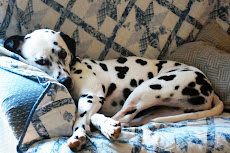





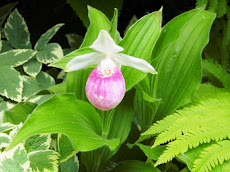

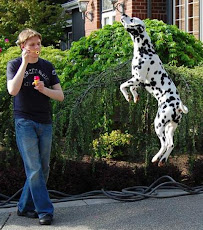

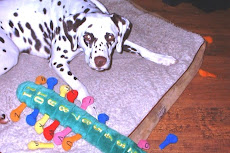

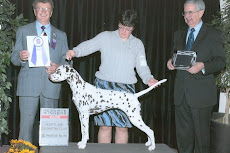
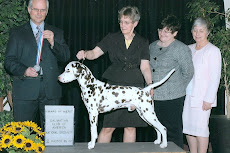


























No comments:
Post a Comment